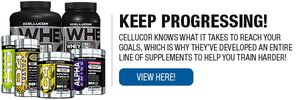01dragonslayer
Ripped
- Jacked Cash
- 487,023
Have you been a regular at the gym for at least six months and haven’t made any real gains in size, strength, or performance?
It could be your workout program preventing you from achieving your best results. Read on to see if it’s time to give your training routine the axe.
Of course the opposite of training for everything is training for nothing, which is just as bad. Pick one or maybe two goals and give them everything that you have for 12 weeks. Your progress will come much, much sooner than if you train to run a marathon, perform in a bench press competition, pose in a bodybuilding show, and increase your 40 yard dash time all at the same time.
Zero in on your goal and have relentless focus! If the program you are doing right now has no direction (or too many directions) and you're not progressing, ditch it! Find a program that will bring you to your specific goals and get to work. Once you have found a proper program, stick to it for at least eight to ten weeks and give your body time to adapt and make progress. You won't be disappointed.

Some of the ways that a good program will ensure that you are constantly progressing are increasing volume (sets x reps x load), increasing intensity (% of 1RM), swapping easier versions of an exercise for more advanced versions, and implementing advanced techniques like rest-pause, drop sets, paused reps, accommodating resistance (bands and chains), iso-holds, and 1½ reps.
If your program doesn’t apply any of the above methods of progression systematically, and is nothing but a list of exercises with sets and reps, it will only work for a time and then your body will wise up, adapt, and quit making gains. Ensure that the program you are on will provide you the necessary progression that will bring you all the way to your goals!
If your workout program only lasts four weeks and it will take you 12 weeks to achieve your goal, then start looking for programs that will provide you the necessary progression. Once you have picked a direction, find a program that ensures proper progression and long term gains.
Whether we try to or not, we all have a tendency to focus on the muscles that we can see in the mirror (chest, biceps, abs) and forget about the muscles that we can’t see (back, hamstrings, glutes). If your program doesn’t ensure that you are giving every body part its due diligence, don’t be surprised when aches, pains, and injuries start to emerge. Not to mention an unbalanced physique is pretty goofy looking too.

A balanced physique can push, pull, squat, and hip hinge, and a balanced program includes all of these elements in relatively equal proportions. A balanced program will have even amounts of pushing to pulling and squatting to hip hinging. If you are already imbalanced you can adjust your ratios accordingly. For example, if you have spent years bench pressing while neglecting your back, you can adjust your pulling to pushing ratio from 1:1 to 2:1.
Take a harder look at your program and tally up the amount of pushing, pulling, squatting, and hip hinging to see just how balanced your program is. If your ratios are extremely lopsided, then you might want to start looking for a more balanced program.
While it is interesting to know how Hugh Jackman trains for Wolverine, Dwayne Johnson trained for Hercules, or Flex Lewis prepares for Mr. Universe, all of these men have different fitness levels and training histories from each other and from you. Performing someone else’s program may work for some who have a similar training history, but those individuals are few and far between.
If you are just starting in your fitness journey, you are better sticking with the basics and finding a program that fits into your lifestyle and your schedule and helps you achieve your goals. Using Mr. Olympia’s training program will not turn you into Mr Olympia. In fact, if you are just starting out, you are more likely to over train or injure yourself on a training plan that is designed for an advanced trainee.

If you take into account these four areas when choosing a training program you won't go wrong. It doesn’t matter what your goals are, you will make progress. Make sure your next training program has direction, provides ways to progress, is balanced, and is appropriate for where you are on your fitness journey.
It could be your workout program preventing you from achieving your best results. Read on to see if it’s time to give your training routine the axe.
1. Your Workout Has No Direction (Or Too Many Different Ones)
I know it’s popular these days to train for every possible goal at once, but you need to narrow down your goals to a few focused points like gaining muscle, getting stronger, losing fat, or increasing sport performance.Of course the opposite of training for everything is training for nothing, which is just as bad. Pick one or maybe two goals and give them everything that you have for 12 weeks. Your progress will come much, much sooner than if you train to run a marathon, perform in a bench press competition, pose in a bodybuilding show, and increase your 40 yard dash time all at the same time.
Zero in on your goal and have relentless focus! If the program you are doing right now has no direction (or too many directions) and you're not progressing, ditch it! Find a program that will bring you to your specific goals and get to work. Once you have found a proper program, stick to it for at least eight to ten weeks and give your body time to adapt and make progress. You won't be disappointed.
2. Your Workout has no Progression
If you are not making any progress with your current program, then you're just spinning your wheels. A great workout program should allow for you to make progressive gains in size, strength, power, or endurance.
Some of the ways that a good program will ensure that you are constantly progressing are increasing volume (sets x reps x load), increasing intensity (% of 1RM), swapping easier versions of an exercise for more advanced versions, and implementing advanced techniques like rest-pause, drop sets, paused reps, accommodating resistance (bands and chains), iso-holds, and 1½ reps.
If your program doesn’t apply any of the above methods of progression systematically, and is nothing but a list of exercises with sets and reps, it will only work for a time and then your body will wise up, adapt, and quit making gains. Ensure that the program you are on will provide you the necessary progression that will bring you all the way to your goals!
If your workout program only lasts four weeks and it will take you 12 weeks to achieve your goal, then start looking for programs that will provide you the necessary progression. Once you have picked a direction, find a program that ensures proper progression and long term gains.
3. Your Workout has no Balance
Athletes, weekend warriors, and gym rats all fundamentally move the same way. Our bodies require balance.Whether we try to or not, we all have a tendency to focus on the muscles that we can see in the mirror (chest, biceps, abs) and forget about the muscles that we can’t see (back, hamstrings, glutes). If your program doesn’t ensure that you are giving every body part its due diligence, don’t be surprised when aches, pains, and injuries start to emerge. Not to mention an unbalanced physique is pretty goofy looking too.

A balanced physique can push, pull, squat, and hip hinge, and a balanced program includes all of these elements in relatively equal proportions. A balanced program will have even amounts of pushing to pulling and squatting to hip hinging. If you are already imbalanced you can adjust your ratios accordingly. For example, if you have spent years bench pressing while neglecting your back, you can adjust your pulling to pushing ratio from 1:1 to 2:1.
Take a harder look at your program and tally up the amount of pushing, pulling, squatting, and hip hinging to see just how balanced your program is. If your ratios are extremely lopsided, then you might want to start looking for a more balanced program.
4. Your Workout Isn't Meant for You
There is a common misconception that if you perform the same workout as a celebrity or pro athlete, you will magically transform into that person. This is perhaps the biggest misconception when it comes to picking workout programs.While it is interesting to know how Hugh Jackman trains for Wolverine, Dwayne Johnson trained for Hercules, or Flex Lewis prepares for Mr. Universe, all of these men have different fitness levels and training histories from each other and from you. Performing someone else’s program may work for some who have a similar training history, but those individuals are few and far between.
If you are just starting in your fitness journey, you are better sticking with the basics and finding a program that fits into your lifestyle and your schedule and helps you achieve your goals. Using Mr. Olympia’s training program will not turn you into Mr Olympia. In fact, if you are just starting out, you are more likely to over train or injure yourself on a training plan that is designed for an advanced trainee.

If you take into account these four areas when choosing a training program you won't go wrong. It doesn’t matter what your goals are, you will make progress. Make sure your next training program has direction, provides ways to progress, is balanced, and is appropriate for where you are on your fitness journey.

